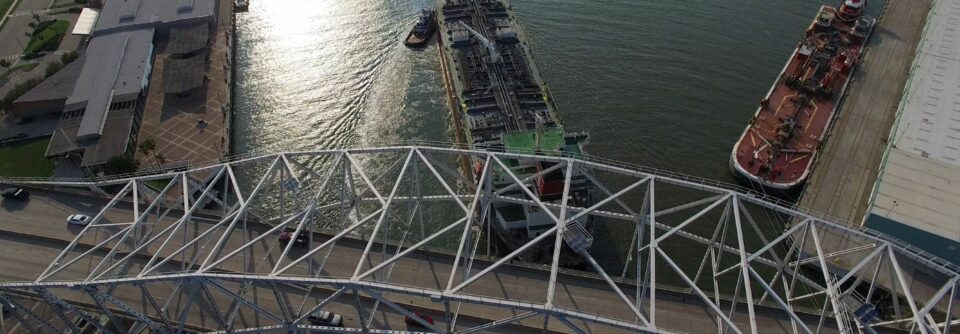Port of Corpus Christi responds to United Nations Intergovernmental Panel on Climate Change, Announces Carbon-Neutral (blue) Hydrogen Production Facility
Aug 12, 2021

Corpus Christi, TX, USA – The Port of Corpus Christi Authority (Port of Corpus Christi) and Howard Midstream Energy Partners, LLC (Howard/HEP) have executed a Memorandum of Understanding (MOU) stating their intention to convert Howard’s Javelina refinery services facility into the region’s first carbon-neutral hydrogen production facility.
Howard’s Javelina facility is strategically positioned in the Port of Corpus Christi with pipeline connectivity to all six of the local refineries. Javelina controls approximately sixty million cubic feet per day (MMcf/d) of hydrogen production through a combination of hydrogen entrained in the refineries’ waste gas that the facility processes, and hydrogen produced through a steam methane reformer process. This hydrogen is currently sold back to refineries and other industries where it is used to remove impurities like sulfur during the refining process. The Port of Corpus Christi and Howard ultimately hope to scale hydrogen production for exports to overseas demand centers.
“With this exciting project and progressive partnership with the Port of Corpus Christi, we are demonstrating yet again our commitment to delivering clean, reliable energy that powers communities and business around the world,” said Mike Howard, HEP Chairman and Chief Executive Officer.
Hydrogen is a flexible energy carrier with high energy density. It has many of the same applications as traditional fossil fuels yet produces no carbon emissions. It can be combusted directly or used in fuel cells and offers the most viable path to reducing emissions in the steel, cement and shipping industries. Hydrogen atoms can be separated from water (H2O) or from natural gas (CH4), the latter of which is in abundance at the Port of Corpus Christi due to direct connections to the Permian Basin and Eagle Ford Shale production fields.
According to the MOU, Howard intends to capture its carbon emissions at Javelina, avoiding atmospheric release which contributes to global warming. The Parties will collaborate to identify uses for the residual CO2 as well as capture and storage options. Captured CO2 can be directed to industries that require it for production, such as steel, or that assimilate it, like cement.
The Port of Corpus Christi is uniquely suited to become the nation’s premier carbon capture and sequestration management hub based on the high density of industrial CO2 emitters, a robust network of existing pipeline infrastructure, and the Port Authority’s ownership of lands leading to state waters in the Gulf of Mexico. Academics from the University of Texas at Austin have mapped the geology of the Texas Gulf Coast and have determined this region is uniquely suited for injection and storage of pressurized CO2. The Port of Corpus Christi has committed to developing much needed infrastructure to collect and pressurize CO2 for injection in permanent geological storage formations offshore in the Gulf of Mexico.
“To the extent that our identity as the leading export gateway for U.S. produced hydrocarbons has been solidified, we see an elegant symmetry in the prospect of becoming the nation’s premier hub for carbon management,” said Jeff Pollack, Chief Strategy and Sustainability Officer for the Port of Corpus Christi.
On August 7, the Intergovernmental Panel on Climate Change (IPCC) released its Sixth Assessment Report which calls for immediate, unified and aggressive action if the nations of the world are to avoid the most dire impacts of climate change, such as devastating drought and more frequent and intense storms. The report defines the imperative for elimination of all CO2 emissions by 2050 and for the development of infrastructure to capture and permanently store carbon.
In the wake of the IPCC report, the Port of Corpus Christi has redoubled its commitment to lead atmospheric decarbonization of the energy sector and to embrace the energy transition.
“The mandate in the latest IPCC report is clear, and while the energy sector certainly can’t shoulder this responsibility on its own, we must lead by example,” said Sean Strawbridge, Chief Executive Officer for the Port of Corpus Christi. “Our future as the ‘Energy Port of the Americas’ starts with building a scalable carbon capture and storage solution to serve the needs of our existing customers and convert more Texas gas into carbon neutral hydrogen for the global markets.”
About Port of Corpus Christi Authority
As a leader in U.S. Crude Oil export ports and a major economic engine of Texas and the nation, Port of Corpus Christi is the largest port in the United States in total revenue tonnage. Strategically located on the western Gulf of Mexico with a 36-mile, soon to be 54-foot (MLLW) deep channel, Port of Corpus Christi is a major gateway to international and domestic maritime commerce. The Port has excellent railroad and highway network connectivity via three North American Class-1 railroads and two major interstate highways. With an outstanding staff overseen by its seven-member commission, Port of Corpus Christi is “Moving America’s Energy.” www.portofcc.com
About Howard Energy Partners
San Antonio-based Howard Midstream Energy Partners, LLC d/b/a Howard Energy Partners is an independent midstream energy company, owning and operating natural gas and crude oil gathering and transportation pipelines, natural gas processing plants, liquid storage terminals, deep-water dock and terminal facilities, rail, terminal and transloading facilities and other related midstream assets in Texas, New Mexico, Oklahoma, Pennsylvania and Mexico. The company has corporate offices in San Antonio, Houston and Monterrey, Mexico. For more information on Howard Energy Partners, please visit our website www.howardenergypartners.com.
• Join the Energy Port of the Americas on Social Media •
###
Click for PDF of PCCA Press Release – PCCA Announces Howard Energy MOU

